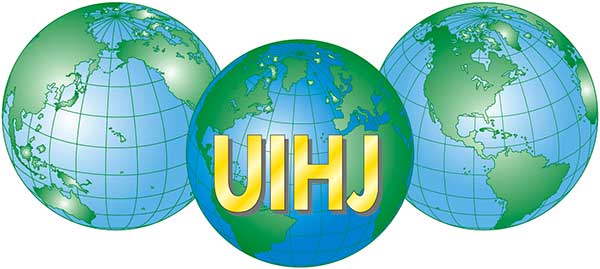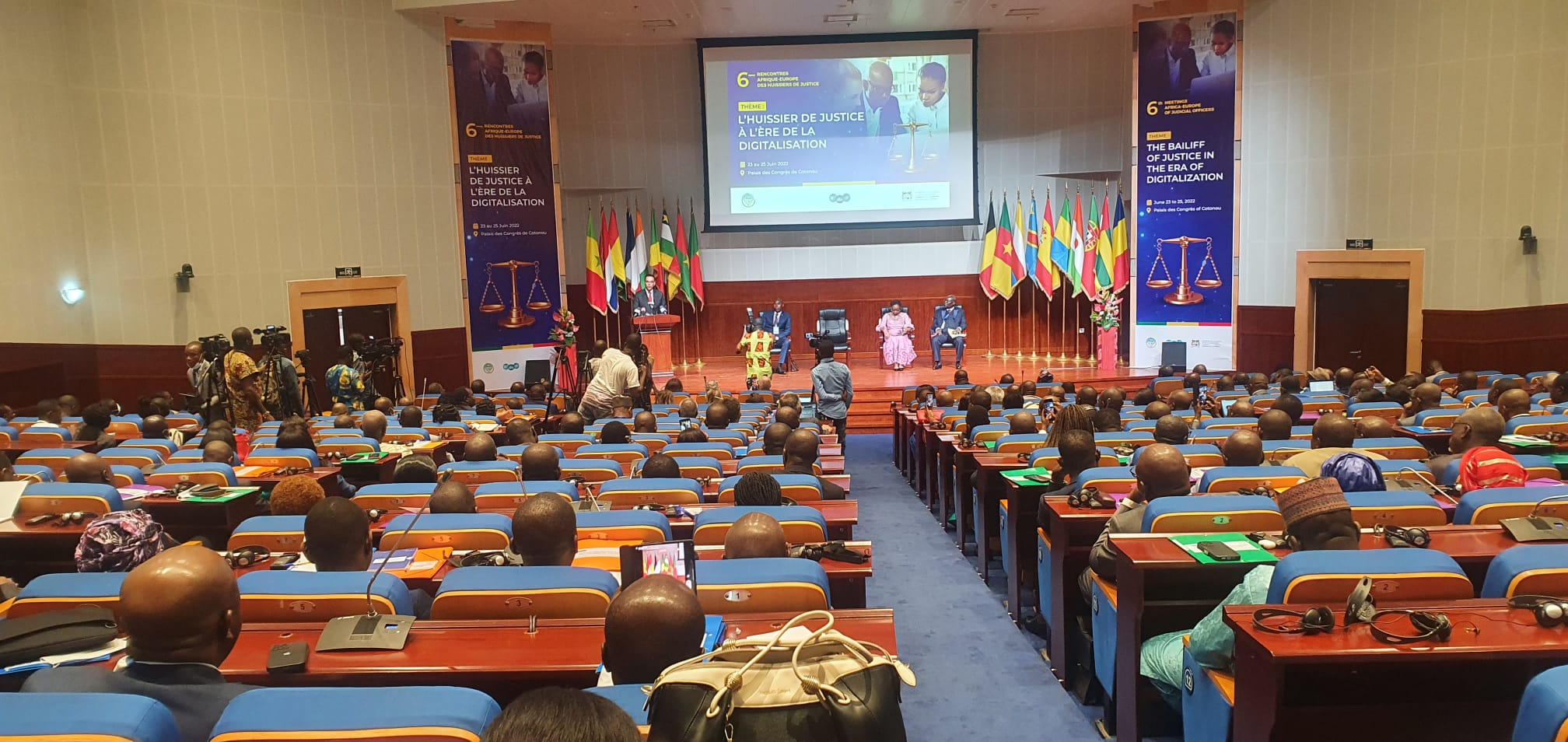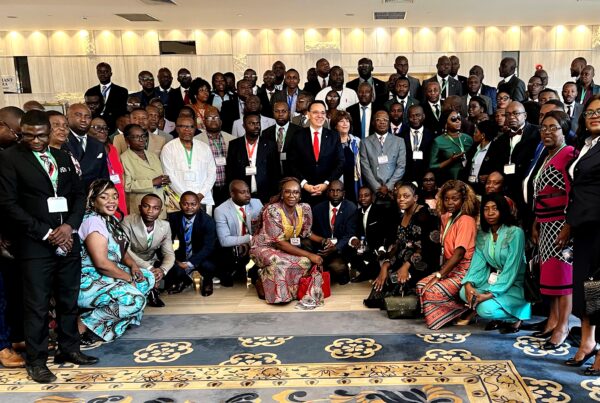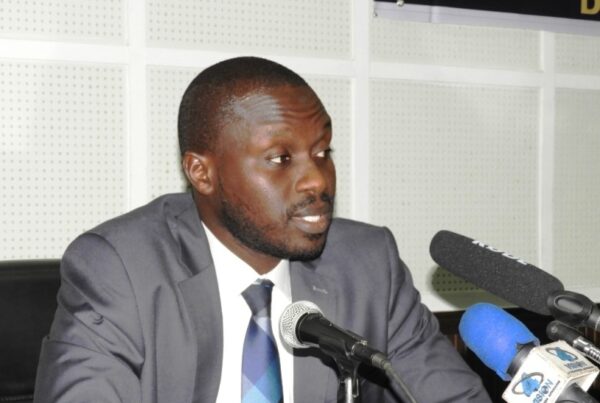The UIHJ organised with the National Chamber of Judicial Officers of Benin, under the aegis of the Ministry of Justice of Benin, the 6th Africa Europe Meetings of Judicial Officers on the theme of “The Judicial Officer in the era of digitalisation”, at the Congress Palace in Cotonou. These meetings were dedicated to the memory of the late Marcellin Comlan Zossoungbo, past President of the National Chamber of Judicial Officers of Benin.
The meetings, perfectly organised thanks to the involvement and work of Charles Coovi, President of the National Chamber of Judicial Officers of Benin, and the members of his board, proved to be a total success.
The 20 countries present were: Algeria, Benin, Belgium, Burkina Faso, Cameroon, Central African Republic, Chad, Comoros, Congo, Democratic Republic of Congo, Gabon, Guinea, France, Mali, Niger, the Netherlands, Portugal, Senegal, Spain, and Togo. Representatives of Niger’s high courts and constituted bodies were also present, including the President of the Constitutional Court of Benin, as well as representatives of the bar, notaries, auctioneers, the Training School for Judicial Professions, Ersuma, represented by its Director General Mayatta Mbaye Ndiaye, and the adviser to the Minister of Justice of the Democratic Republic of Congo.
During the opening ceremony, Charles Coovi welcomed all the participants and thanked them for coming. He paid tribute to the memory of his predecessor, Marcellin Zossoungbo, who died in 2021 from Covid-19. He mentioned that the latter had been able to convince the members of the UIHJ of Benin’s ability to organise the 6th Africa Europe Meetings of Judicial Officers. A minute of silence was observed in his memory.
Alain Ngongang Sime, President of the African Union of Judicial Officers, expressed his joy at taking part in the 6th Africa Europe Meetings of Judicial Officers. He thanked the UIHJ for its invitation and Charles Coovi for his welcome and the perfect organisation of the event.
The opening speech by Marc Schmitz, President of the UIHJ, is reproduced hereafter.
(Welcome)
Allow me to welcome you to the 6th Africa Europe Meetings, here in Cotonou, Benin, which are taking place under the theme “The judicial officer in the era of digitalisation”.
It was in October 2008 that the first Africa-Europe Meetings of judicial officers took place in Libreville, Gabon, on the theme of “The judicial officer: between tradition and modernity”. The richness of the debates and the high level of the interventions brought recommendations unanimously formulated by the judicial officers of the two continents.
Building on this success, the UIHJ decided to perpetuate this event and to make it one of the main meetings in its agenda. Thus, were organised in October 2010 the second Africa-Europe Meetings of judicial officers, in Yaoundé, Cameroon, on the theme of “The judicial officer in the era of the knowledge economy”. Subsequently, the third Meetings, which took place in 2013 in Lomé, Togo, gave the opportunity to demonstrate that the judicial officer is a full “actor of good governance”. The fourth Africa-Europe meetings took place in Dakar in 2016. They focused on the theme of “The harmonisation of national legislation: a factor of economic security”.
The fifth meetings, which took place in Brazzaville, Congo, from 12 to 14 June 2019, focused on the theme: “Cross-border enforcement: towards an African enforcement order?”. Nearly 300 participants, judicial officers, university professors and other legal professionals took part in the work at the Kintélé International Conference Centre.
The sixth meetings which are currently taking place in Cotonou and which are organised in partnership with the National Chamber of Judicial Officers of Benin, are in the line of the previous ones. This meeting constitutes, like the preceding editions, an opportunity to share experiences and best practices, as well as the possibility of establishing relations between the African and European continents with a view to harmonising the profession of judicial officer and civil enforcement procedures worldwide.
It was “The Call of Dakar” from 18 to 20 April 1996, the first international conference organised by the UIHJ in Africa on the theme “The judicial officer, his future in a legal and judicial area“, which introduced the UIHJ to the National Chamber of Judicial Officers of Benin – then chaired by Robert Bonou – as well as with eight other African national chambers: Burkina Faso, Congo, Gabon, Ivory Coast, Mali, Senegal, Togo and Tunisia.
On this occasion, I would like to recall the visionary concluding remarks of ” The Call of Dakar” delivered by our late President Jacques Isnard: “The Union wanted to launch this message here in Dakar on the occasion of this first seminar of African judicial officers. This event is a symbol of our action because it concretises the will of our organisation to open up to the judicial officers of the African continent. African judicial officers are entitled to expect from the UIHJ the same consideration as their colleagues from other continents”.
The “Call of Dakar” laid the foundations for the cooperation between the UIHJ and Africa which led 30 African countries to gradually join the ranks of our organisation. Among these bases of cooperation, we count:
- The cooperation with governments for the introduction or the promotion of the judicial officer;
- The collaboration in the study of new international conventions;
- The assistance in the training and distribution of legal documentation, as well as
- The promotion of symposiums, seminars or conferences with the participation of colleagues and local specialists.
For more than 25 years, and after about forty Ufohja seminars, the 6th Africa Europe Meetings of Judicial Officers show here, in Cotonou, the constant will of the UIHJ to comply with the wishes of “The Call of Dakar“, and I am particularly proud to be able to pursue and further strengthen this cooperation with each and every one of you.
But let us return to the relations that the UIHJ has established with our colleagues in Benin. A few weeks after “The Call of Dakar“, in June 1996, the National Chamber of Judicial Officers of Benin presented its candidacy for membership of the UIHJ during the permanent council of the UIHJ in Baden-Baden, Germany. Benin became a member of the UIHJ during the International Congress of Judicial Officers in Stockholm, in May 1997.
The National Chamber of Judicial Officers of Benin therefore becomes a particularly active member of the UIHJ and participates in all meetings, events, conferences, permanent councils, councils of African presidents, international congresses, World Days of the Judicial Officer, Ufohja seminars, Africa-Europe meetings of judicial officers, or even Ersuma training and relations with Ohada and Uemoa.
After about fifteen training seminars, where Claudine Mougni and Hortense Bankolé de Sousa fully invest themselves as expert trainers, it was decided in 2001 to create the Training Unit for African Judicial Officers (Ufohja). The principle of Ufohja is voted at the Permanent Council of Cairo on 25 April 2002 and Ufohja comes into force in Niamey on 18 June 2002. Claudine Mougni is appointed secretary of its Board of Directors.
In May 2005, Benin was the first country to host the Council of African Presidents of the UIHJ, in the presence of the eminent Professor Dorothée Cossi Sossa, then Minister of Justice of Benin and with whom the UIHJ has developed excellent relations during his mandate as Permanent Secretary of Ohada.
On 3 November 2007, in the same enclosure of the Congress palace of Cotonou where we stand today, was held in the presence of Gustave Anani Kassa, Minister of Justice of Benin, and Jacques Isnard, the ceremony of elevation of Robert Bonou to the dignity of Honorary President of the National Chamber of Judicial Officers of Benin. The diploma of honour of the UIHJ had previously been awarded to him in October of the same year.
In February 2012, under the presidency of Wikili Laguidé, a Ufohja seminar took place in Cotonou on the theme of “lease contract and its enforcement” which met with great success with its interactive workshops.
As you can see, despite its small size and less than fifty judicial officers, Benin is extremely active within the UIHJ and has been able to demonstrate at all times its deep attachment and unfailing loyalty to our organisation. As such, I would like to greet and warmly thank the women and men who were invested since 1996 presidents of the National Chamber of Judicial Officers of Benin:
- Robert Bonou, from 1996 to 2007 ;
- Hortense Bankolé de Sousa, from 2007 to 2011 ;
- Wakili Laguidé, from 2011 to 2015 ;
- Monique Kotchofa Faihun, from 2015 à 2019 ;
- Marcellin Comlan Zossoungbo, from 2019 to 2021 ;
- Simplice Dako, Interim president in 2021 ;
- and Charles Coovi, since 2021.
I would also like to greet and thank all the Beninese colleagues, as well as all the members of the National Chamber of Judicial Officers of Benin, who have accompanied us for so many years within our large family of judicial officers of the world, in particular Claudine Mougni who played a big role in the relations between the UIHJ and the profession of judicial officer, not only in Benin, but also in other African countries.
Finally, I would like once again to honour the memory of our late colleague, President Marcellin Comlan Zossoungbo, victim of Covid-19 and who died on 30 January 2021. We were all in shock following the death of this exceptional man who was unanimously appreciated, who sacrificed everything to lead with rigour, openness and determination, the destiny of his profession in Benin, and who was considered a close friend of all those who knew him. His passing was a huge loss for our profession. I suggest that you dedicate these 6th Africa Europe Meetings of Judicial Officers to his memory.
The UIHJ has found in the National Chamber of Judicial Officers of Benin and in its president, Charles Coovi, a strong and trustworthy partner for the organisation of this flagship event of the UIHJ in 2022. On the occasion of the Africa Europe Meetings, 19 foreign delegations are in attendance, in addition to the representatives of international institutions with which the UIHJ maintains close relations. I would like to thank them all for being with us at this important event.
I also take the opportunity to particularly welcome the presence of Alain Ngongang, President of the African Union of Judicial Officers (UAHJ). I think I can say that the presence of the President of the UAHJ at this event testifies to the excellent understanding that reigns between our two organisations. We all work for the same cause: to ensure the future of our profession!
I now wish us excellent work and thank you all once again for your presence. Thank you for your attention. »
Aurélie Adam Soulé Zoumarou, Minister in Charge of Digital Economy and Digitalisation of Benin, representing Séverin Quenum, Keeper of the Seals, Minister of Justice and Legislation of Benin, unable to attend, welcomed all participants to Benin. She reported that, under the impetus of Patrice Talon, President of the Republic of Benin, a vast project for the digitalisation of public administration, the dematerialisation of public services and the digital transformation of all sectors of activity, including the justice sector, whose showcase is the Cotonou commercial court, has been initiated. She acknowledged that the central theme of the 6th Africa Europe meetings of judicial officers is more than topical, that judicial officers cannot imagine “exercising their noble profession without opening up to digital technology” and that they should adapt to the demands of the times, like other legal professions.
Professor Joseph Djogbenou, President of the Constitutional Court of Benin, addressed the complex theme of “Does digitization still leave a future for the private judicial officer?”, in the form of an inaugural lesson of a very high scientific level, starting from the postulate that the future of the judicial officer is the future of justice to conclude that digitalisation and automation are challenges that must be taken up by the profession.
The meetings were divided into two parts, one devoted to the digitalisation of justice, and the other on the digitalisation of the profession of judicial officer. The first part (digitalisation of justice) was divided into three panels.
The first panel concerned the connection with digitalised State jurisdictions. It was moderated by Eric Montcho Agbassa, Director General of the School of Judicial Training. Luis Ignacio Ortega Alcubierre, Vice-President of the UIHJ, evoked the judicial officer at the age of the Private Virtual Lawyers Network (RPVA) and other modes of contact between the courts and other European justice professionals. William Kodjoh-Kpakpassou, President of the Commercial Court of Benin, presented the theme of the judicial officer faced with the digitalisation of courts in Africa. Then Eric Rustique Mongazi, information and communication technology expert, member of the Legal Unit of the Ministry of Digital and Digitalisation of Benin, and Boris Rodrique Sehlouan, Director of Digitalisation of the Ministry of Digital and Digitalisation of Benin, presented the functioning of dematerialised legal documents in Benin.
The second panel, dedicated to the connection with digitalised alternative dispute resolution (ADR) methods, was moderated by Edouard Kitio, Magistrate, Director of Research and Documentation of Ersuma. Jérôme Gérard Okemba Ngabondo, President of the National Chamber of Judicial Officers of Congo, wondered about the judicial officer and the expert: collaboration or competition? Christine Valès, member of the board of the UIHJ, member of the National Chamber of Commissioners of Justice of France, raised the issue of arbitration and the French mediation platform by means of a pre-recorded video.
The third panel, moderated by Jean-Didier Bidié, Vice-President of the UIHJ, was devoted to Digitalisation, Evidence and Enforcement. Mathieu Chardon, Secretary General of the UIHJ, presented the digital statement of facts. Marc Schmitz discussed digital enforcement legal considerations through the Global Code of Digital Enforcement drafted by the UIHJ. Then Paulo Teixeira, President of the Order of Solicitadores of Portugal, and Paulo Duarte Pinto, President of the National Chamber of Enforcement Solicitors of Portugal, gave concrete examples of digital enforcement proceedings in Portugal.
The second part of the meetings (digitalisation of the profession of judicial officer) included two panels, one on the digital office, and the other on Legaltech.
The first panel (the digital office) was moderated by Amadou Tanimouddari, former President of the National Chamber of Judicial Officers of Niger. Françoise Andrieux, Honorary President of the UIHJ, raised the issue of digital technology and the drafting of documents. Then, Jos Uitdehaag, First Vice-President of the UIHJ, explained how to digitally manage an office of judicial officer: customer contact, field management, functioning, accounting.
The second panel, “Imagine your Legaltech and set it up: European and African experiences”, was moderated by Adama Dia, President of the National Order of Judicial Officers of Senegal. European Solutions were presented by Patrick Gielen, Secretary of the Board of the UIHJ. African Solutions were presented by Luc Sowah, President of the National Chamber of Judicial Officers of Togo.
Finally, two representatives of the Mercure H company, Jean Marius Noumon, tax lawyer, and Yawo Koukoui, accountant-programmer, presented the software they created for judicial officers in the Ohada zone.
Following this panel, Adolphe Iotala Boketsu, adviser to the Minister of Justice of the Democratic Republic of Congo, took the floor to thank the organisers of the 6th Africa Europe Meetings of Judicial Officers for their invitation. He mentioned the law of 15 July 2016 on the creation and organisation of the profession of liberal judicial officer, in order to ensure a better enforcement of court decisions in the DRC. He addressed his warm thanks to the UIHJ for the invaluable help that it brought to the DRC and to the profession of judicial officer in his country.
The conclusions of the 6th Africa Europe Meetings of judicial officers were presented by Guillaume Payan, Law Professor, Member of the scientific Council of the UIHJ. The summary report of the meetings and its recommendations were presented by Samuel Ename Nkwane, President of the National Chamber of Judicial Officers of Cameroon, Secretary General of the Training Unit for African Judicial Officers (Ufohja).
During the closing ceremony, Charles Coovi thanked all the participants for their attendance and wished them a good stay in Benin and a safe return to their respective countries. He expressed his gratitude to Patrice Talon, President of the Republic of Benin, for his moral and financial support, as well as to Séverin Quenum, Minister of Justice, throughout the organisation of the event, and also to the other ministries involved.
Marc Schmitz, in turn, thanked all the participants. He congratulated the National Chamber of Judicial Officers of Benin for the excellence of its welcome and its perfect organisation of the event. He also expressed his thanks to the President of the Republic of Benin, Patrice Talon, as well as to Séverin Quenum.
Finally, Séverin Quenum, Keeper of the Seals, Minister of Justice and Legislation of Benin, confirmed the full support of President Patrice Talon within the framework of the organisation of the meetings. He indicated that he would ensure the implementation of the recommendations made. He explained that the judicial officer is upstream and downstream of the work of justice and presents a human face that the digitalisation of justice will have to preserve.
After a superb gala evening, the participants met the next day for the cultural part of the meetings. They first had the privilege of visiting the exhibition event “Art of Benin yesterday and today: from Restitution to Revelation” which displayed the 26 royal treasures returned by France, as well as contemporary works by Beninese artists: sculptures, paintings, installations, arts, videos… Everyone then went to the city of Ouidah to gather at the tomb of Marcellin Zossoungbo and eat in the sumptuous setting of the Casa Del Papa restaurant, by the ocean.
The UIHJ once again addresses its congratulations and thanks to the Chamber of Judicial Officers of Benin, represented by its President, Charles Coovi, for the perfect organisation of the 6th Africa Europe Meetings of Judicial Officers, which will remain engraved in the heart of each participant as an exceptional event.
Recommendations of the 6th Africa Europe Meetings of Judicial Officers
Cotonou, 24 June 2022
In consideration that:
- Technology is an essential tool for the proper functioning of the judicial officer’s profession, for its development and for the optimal implementation of civil enforcement procedures, always safeguarding the interests of justice, litigants and the Rule of law.
- The predominance of the human character remains at the heart of the activities of the judicial officer’s profession and constitutes a permanent challenge, in the context of Cyber Justice.
- Training, including that of digital techniques, is an essential tool for the development of the profession of judicial officer, including in the process of keeping disputes out of courts.
- The growing influence of alternative dispute resolution methods in a general process of keeping disputes out of courts requires the involvement of judicial officers, in their capacity as trusted third parties and proximity jurists.
- The Global Code of Digital Enforcement presented at the 24th International Congress of Judicial Officers in Dubai in November 2021 constitutes a unique opportunity for judicial officers to encourage the implementation of global legislative provisions relating to the digital enforcement of court decisions and other enforceable titles.
The participants in the 6th Africa Europe Meetings of Judicial Officers recommend:
1 – As part of all judicial officers’ activities, digital technologies must not break or diminish the essential human link that prevails between judicial officers and litigants, in strict respect for human rights.
2 – Judicial officers must take the initiative of the dematerialisation of their acts and their circulation.
3 – The judicial officers must engage in a concerted way in the computerisation of their offices.
4 – Judicial officers must be trained in information and communication technologies and techniques of alternative dispute resolution methods, including in dematerialised form.
5 – Judicial officers must promote the principles included in the Global Code of Digital Enforcement to their authorities and institutions, and stakeholders.





